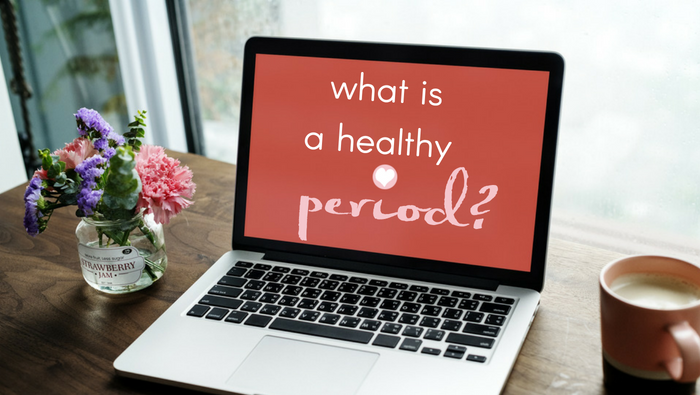What IS a healthy period?
If you believe all you see on TV, it’s rolling skating down a promenade on a sunny day wearing a big grin and the market’s best selling tampon.
The perfect period. If only, eh?
Well, I’m not sure there is such a thing as a perfect period.
You may be jealous of the gal who says “my monthly is really light, quick, pain free and no hassle” but maybe not if she’s not building up a healthy womb lining for pregnancy.
So there may not be period perfection, but there are some signs of a healthy period and cycle. A kind of range of “normal”.
What is that, then? And what to do if you’re concerned.
Cycle Length
Your cycle should be between 25-35 days long.
Shorter cycles can suggest haywire hormones – usually too much oestrogen in relation to progesterone. I can also mean it’s tougher falling pregnant because the second part of the cycle (after ovulation) is too short. Many experts say the second part of the cycle should be at least 12 days, but 10 or less is considered short.
If your cycles are long, again you may have hormone imbalance or a condition that is messing with ovulation like PCOS.
Your cycle the same or very similar every month. So if it’s 25 days one month, 35 the next and then 27, I’d say that’s irregular.
One off “irregular” periods can usually be explained by stress, being poorly or getting out of your usual routine, like a holiday.
The Flow
Ooh lovely subject, but the flow should be bright red blood.
If it’s dark or brown, it can be a sign that blood isn’t flowing well. Dark blood and clots can also be a sign that you have too much oestrogen in relation to progesterone.
It really shouldn’t be very clotty. A few very small clots on the first day is thought normal.
It should be a good flow, so you notice…but not so heavy, you daren’t laugh for fear of flooding your own pants. AND have to hug the toilet for days…instead of roller skating in the tampon ad.
It’s not really healthy to have to get up at night to change your tampon or towel because the flow is so heavy.
3-5 days of bleeding is average. But 2-7 is considered normal.
PMS is NOT To Be Expected
PMS isn’t part of a healthy period. It’s usually a sign that there is an imbalance somewhere.
Sure, many of your girl friends will tell you about the hideous cramps, Bitch-Troll-From-Hell moods and binge eating chocolate, but it really isn’t “normal”.
Maybe it’s you who breaks out in terrible teenage type acne and whose breasts swell like zeppelins?
My best tip for PMS is eat a blood sugar balancing diet i.e. eat good quality protein with every meal and snack, eat good fats and avoid sugar and “white” refined carbs like the plague.
I’d say don’t be too concerned if you experience mild symptoms, like slight cramping, feeling sensitive and a skin breakout. Severe symptoms should be checked out.
Changes To Mucus
It’s totally normal to notice the discharge in your smalls.
And it’s totally healthy to see it change over your cycle.
Mother Nature intends it to change over your cycle so around ovulation you get a stretchy “egg whitey” mucus that helps sperm swim up it.
Not a lot of people know that!
Before and after ovulation, it tends to be thicker, drier and less clear.
Should I Smell Down There?
The short answer is yes and no.
Yes, you should notice a faint musky smell when you’re not on your period. A faint blood smell when you’re bleeding is okay.
No, you shouldn’t reek. Or smell strongly fishy. That can be a sign of some sort of infection. Especially if you also notice itching, burning, pain, feeling hot or really tired.
Don’t cover up your natural smell with fragrances – they can be full of toxic and nasty chemicals which harm health, your mucus and fertility. Wash with clean water.
Spotting
Some women see “spotting” at ovulation and that’s okay. It lasts 1-2 days and is light.
Some women also get spotting roughly a week after ovulation which is called “implantation spotting”. It’s the time when any embryo would settle into the womb lining.
If you’re bleeding at other times, it’s not really a healthy period or cycle.
Bleeding in the second part of your cycle (after ovulation) might mean you have low progesterone. This is the hormone that holds your womb lining in place for implantation or to be shed if there is no pregnancy.
What Does Your Cycle Say About YOU?
Your cycle holds great clues to your fertility, hormone health and general health.
That’s why I ask women to chart their cycles, especially if they want to get pregnant or they have some unwanted symptoms. Their charts, other info and any test results can help me work out what changes they should make for healthy periods.
What is yours telling YOU? And what if you’re worried there may be something out of whack?
What Should I Do, If I’m Worried?
If you’re worried, see a Doctor. They can arrange any tests to help work out what’s going on for you and discuss your treatment options.
A word of caution.
I have women come to see me who have been told they are “normal” but they don’t think they have a healthy period or cycle.
OR doctors suggest hormonal contraceptives to “suppress” their symptoms and cycle. It’s up to you, of course, but that could be burying a problem not tackling the cause.
There is so much you can do with food choices, lifestyle habits, supplements and natural therapies to sort out your own haywire cycles. If you want to find out how I can help you with that, drop me a line.
Enjoy your roller skating *winks*
Love,



Hi Kathy
Im wondering if u can advise me about cervical mucus. I don’t get any around ovulation at all. I have changed my diet significantly cutting out sugar, processed food, dairy etc. I’ve been trying to get pregnant for the last 4.5 years…and pms can still be difficult for me.
Hi there, there can be lots of causes for low stretchy mucus including dehydration, hormone imbalance, fertility and other medications, scar tissue as a result of procedures. It’s worth speaking to your doctor. Some tips for trying to improve mucus include drinking plenty of filtered water, regular and gentle exercise, plenty of essential fatty acids from oily fish, nuts and seeds, coconut oil, avocado. extra virgin olive oil etc or supplementing (again speak to you doctor first) and using only a natural lubricant for intercourse like Preseed. It’s a good question. Might have to write a blog on this. If you haven’t already, you might like to grab my FREE guide 7 Steps To Boost Fertility https://kathypaynenaturalhealth.simplero.com/page/64181 Love, Kathy x